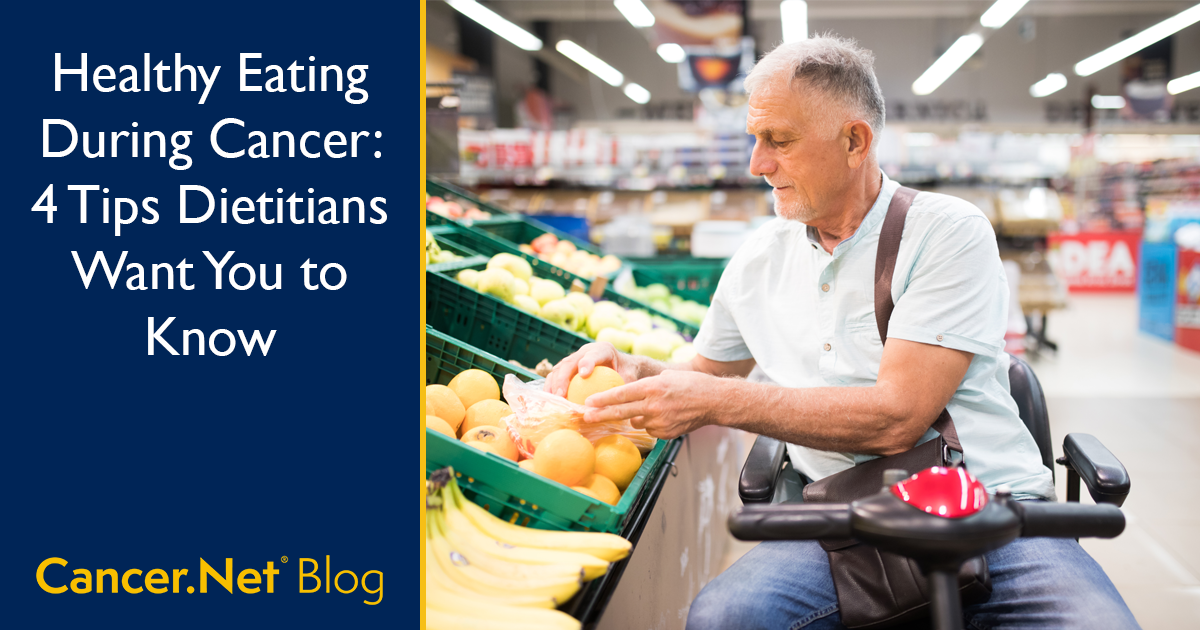
Jill Bice, MS, RD, LDN, CNSC, CSO, is a registered dietitian at the University of Chicago Medicine. Jill holds a specialty certification in oncology nutrition and works with adults with cancer in the outpatient setting. Luz Chavez, MS, RD, CSO, LDN, is the manager of clinical nutrition and a supportive oncology dietitian at the University of Chicago Medicine.
Eating healthy while undergoing cancer treatment can be very challenging. Side effects from cancer treatment can often decrease a person’s ability to eat, much less to eat healthy. That is why many oncology dietitians refer to these as “nutrition impact symptoms.” During cancer, you may find it difficult to eat food at all, and/or you may find it difficult to digest the food you have eaten.
However, trying to meet your nutrition goals as well as your hydration goals during cancer should be on the top of your priority list as you go through treatment. This will help you from becoming malnourished, which is when you don’t get the calories and nutrients your body needs. Malnourishment and dehydration can lead to more problems during cancer, including having to be admitted to the hospital for additional care.
Here, learn more about healthy eating during cancer, including tips for improving your diet as you undergo cancer treatments and how to get help with accessing nutritious foods.
Challenges to healthy eating during cancer
There can be many obstacles to healthy eating during cancer. For example, many people undergoing cancer treatment experience fatigue, which can make shopping for food, preparing meals, and chewing a chore. The process of treating cancer can also be a time-consuming one, which means people with cancer may spend most of their day at their treatment center going from appointment to appointment. This may leave little time to eat meals, let alone nutritious ones.
Additionally, treating cancer can be costly. The costs of frequent doctors’ visits, treatments, medications, parking fees at facilities, and transportation to and from appointments can add up quickly. People with cancer, as well as their family members, often need to take time off work to attend appointments and treatments. Taking time off work to manage side effects that also limit a person’s ability to work. This can cause financial hardship on many families and may limit their ability to purchase food.
Due to these and other challenges, “eating healthy” can look very different to each person going through cancer treatment.
Tips for improving your diet during cancer
Everyone going through cancer treatment is at a different place with their eating ability and patterns. When starting treatments, one person’s diet may be drastically different from another’s. However, it is important to understand that even small changes to improve your diet can make a big impact on your overall health.
When making nutrition choices, always talk with your doctor or oncology dietitian about what is recommended for you. If you are starting a new treatment, be sure to ask your health care team if there are any foods or supplements that interact with the treatments you will be taking. Make sure to tell your team of any supplements that you are taking so that they can assess them for any interactions, too. You should also ask what the potential side effects are for the treatments you will receive and how you can prepare for them.
In general, below are some tips that people with cancer can follow to have a healthier, more balanced diet during cancer.
1: Aim to include a protein source at each meal.
Plant-based proteins, such as beans, lentils, nuts, nut butters, and soy products, are excellent choices. When choosing animal proteins, try to choose dairy, eggs, poultry, and fish more often than red meats. Eat processed meats only occasionally.
2: Try to include fruits and vegetables in your daily diet if you can.
Fruits and vegetables contain fiber, antioxidants, phytochemicals, vitamins, and minerals, which are all important in a healthy diet. Eating fruits and vegetables in their whole-food form, instead of juicing or powders, ensures you still get the fiber from these foods. It also makes it harder for you to exceed recommended limits.
3: Drink plenty of fluids throughout treatment.
Drinking lots of fluids is important to help you meet your hydration goals. It can also help improve your kidney health. If drinking water is a struggle for you, try using a measured water bottle and set a goal for yourself. If by midday you have not met at least half of your fluid goal, you know that you need to step up your drinking! You can also help flavor water by infusing it with cucumber, lemon, mint, berries, or other fruits to help change up the taste so that you do not get too bored with regular water.
4: If you are experiencing nausea, try eating smaller, more frequent meals.
Nausea is a common side effect of cancer and its treatment. If nausea is an issue for you, eating smaller portions can help make sure you are not too full. In addition, eating frequently helps to make sure you have a base in your stomach most of the day, which can help to reduce nausea.
Many people with cancer may also be “turned off” by looking at a large plate of food. Seeing a smaller portion in front of you may be less overwhelming and help you to actually eat more by the end of the day. If your nausea is controlled, you are more likely to be able to add in nutritious food options like fruits and vegetables. Talk with your doctor about managing nausea using medication if trying to manage it through your diet does not help.
Getting help with accessing nutritious foods during cancer
Financial barriers can affect a person’s ability to follow a healthy diet during cancer. If you are having trouble affording nutritious foods during cancer, visit the Feeding America website for help locating a food bank near you. Food banks can be an excellent place to help you stock your shelves at home. Many food banks only provide shelf-stable items, but getting these items from the food bank can save your food budget so you can purchase other items at the grocery store. Many cancer centers also have social workers available for you to meet with who may be able to help you apply for food vouchers or food stamps, which can help supplement your food budget.
There are also ways you can help reduce your costs during trips to the grocery store. For example, while fruits and vegetables are an important part of a healthy diet, buying fresh produce can quickly add up at the checkout lane. Buying frozen fruits and vegetables instead can be a more cost-effective way to get these foods into your diet. Try to buy versions that do not have sauces or flavorings added to them, as these likely contain added fats and sodium. For protein sources, you can also try using beans, legumes, nuts, and seeds, which are often less expensive than meat. And, you can look for sales at local grocery stores and try to plan meals around what might be at a lower price that week.
Finally, protein drinks, which are often used to supplement a person’s nutrition when they are not able to eat well during cancer, can also become costly when you need to drink them regularly. Reach out to your oncology dietitian, doctor, or insurance plan to see if your insurance might cover the cost of these drinks. Your cancer care team may also have coupons available to help decrease costs.
Remember that there are many resources available to help you improve your nutrition during cancer. Cancer centers often have a registered dietitian and/or a social worker on staff, so if you are concerned about your nutrition or your ability to access healthy foods during treatment, ask for a referral to see them, as they may able to help.
The authors have no relevant relationships to disclose.






